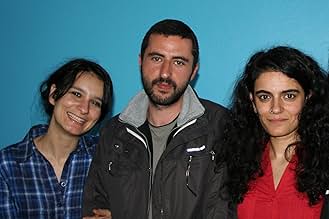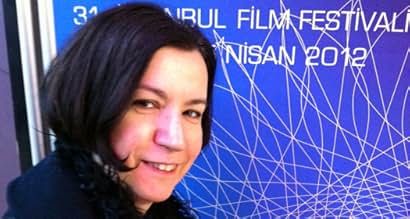Nuri Bilge Ceylan has a lot to answer for. His oeuvre has ushered in a particular style of filmmaking characterized by long takes, minimal movement within the frame, lengthy shots on the protagonists' faces, no music and carefully composed groupings depicting the characters' relationships to the worlds they inhabit.
There is nothing fundamentally wrong with this style - on the contrary, it reminds us of the important relationship between human beings and the worlds they inhabit, and how the apparently inexorable march of capitalism has made us forget our ineffable connection to the elements, earth, wind, fire and water. Ceylan tries to restore that connection through cinematic means.
When we see that style recurring again and again in other directors' movies, however, we begin to wonder whether the thematic purpose of Ceylan's work has descended into cliché. This is certainly true of Belmin Söylemez's debut feature ŞİMDİKİ ZAMAN (PRESENT TENSE), a retreading of familiar thematic and stylistic ground in an attempt to show the sterility of her protagonist Mina's (Sanem Öge's) life.
Set in and around the Beyoğlu area of İstanbul, with shots of İstiklal Caddesi thronged with people, ŞİMDİKİ ZAMAN depicts Mina as a lost soul seeking employment and eventually fetching up as a fortune-teller in a local café. While ostensibly successful at her new vocation, it's evident that the fortunes she tells are not those of her customers, but recollections of her own life. The customers certainly like what they hear, but we are led to speculate whether the entire "profession" of fortune-telling (if it can be described as such) is completely false.
In the end the café is closed down by the police, on suspicion that witchcraft is being practiced therein. Mina is once again cast out on to the streets; although she has occasional appointments with well-to-do ladies, her life is meaningless. Even fortune-telling appears insignificant: the film ends with a memorable image of coffee-cups being washed in water, the brown dregs of each cup creating a cloud before descending to the bottom of the bowl. The "profession" of fortune-telling has quite literally been washed away.
Images such as these draw attention to Söylemez's potential as a filmmaker; but they are oases of pleasure in a one hundred-minute plus film that contains too many longueurs, making us inclined to despise rather than sympathize with Mina's plight. Yes, she might be unemployed, but she appears such a feckless personality that it seems highly unlikely that she will ever improve herself. I am sure that is not what the director intended.













